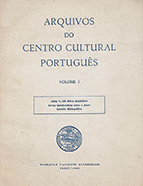

................................
At a glance, the Arquivos reveal a clear convergence between history and literature, becoming more consistent from the mid-1970s onward. This overlap appears in multiple areas: an interest in the biographies of major chroniclers, the history of theatre, the history of Luso-French literature, the discovery and analysis of lesser-known literary texts, and bibliographical studies on notable authors. Within this publication, literary works are frequently regarded as historical sources, with literature perceived as an expression of national culture.
In this magazine, history appears less as a social science and more as a literary discipline, often blending with it. There is a transition from a traditional, scholarly approach to history— heavily influenced by structuralism and reliant on documentary and literary sources— to a form of history that fosters a strong critical sense. However, during the period studied, despite a significant number of foreign contributors, particularly French, the major historiographical trends of the time did not penetrate the publication. This could largely be attributed to the fact that most contributors were more closely aligned with literature than with historical studies.
In 1994, the Arquivos do Centro Cultural Português was renamed the Arquivos do Centro Cultural Calouste Gulbenkian [Archives of the Calouste Gulbenkian Cultural Centre] to reflect the research centre’s name change, though it retained the same character. Maria de Lourdes Belchior continued as editor until shortly before her death in 1997. In 1999, Francisco Bethencourt took over as director, introducing significant organisational changes and restructuring the publication around thematic volumes, mostly written in French. As before, the topics explored extended beyond historical themes to include political, sociological, cultural, anthropological, literary, and artistic perspectives. Portuguese contributors lost their predominant position as the publication increasingly featured contributors from France and other nationalities. The magazine ceased publication in 2005.
This work is financed by national funds through FCT - Foundation for Science and Technology, I.P, in the scope of the projects UIDB/04311/2020 and UIDP/04311/2020.
